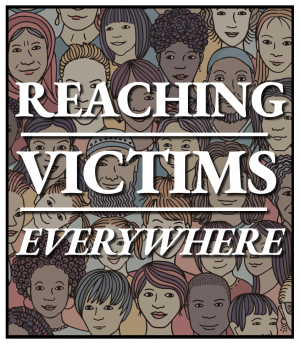Serving Victims Everywhere
OVC believes that crime victims should have access to the evidence-based services and support they need to begin their physical, emotional, and financial recovery. However, OVC recognizes that there are serious challenges to achieving this goal. Strengthening connections across allied fields to expand the availability and the quality of services that impact a victim's healing are among these challenges.
Center for Victim Research
OVC supported the launch of the Center for Victim Research in response to the victim assistance field's call for increased statistical data, evidence-based practices, and program evaluation to guide policymakers, funders, and practitioners. In FY 2018, the center launched its website, https://victimresearch.org, to serve as a one-stop shop where victim service providers, policymakers, and researchers can connect. The Center for Victim Research will facilitate the sharing of knowledge to increase access to victim research and data—and research and data’s utility—to improve accessibility and effectiveness of victim services nationwide.
National Resource Center for Reaching Victims
The OVC-funded National Resource Center for Reaching Victims seeks to be a one-stop shop where providers, policymakers, and other professionals can obtain information and expert guidance to enhance their capacity to identify, reach, and serve all victims, especially those from communities that often have less access to services and fewer avenues to justice. In FY 2018, the center began developing a comprehensive array of training and technical assistance to expand the capacity of victim service programs to identify and reach victims. Its efforts include launching a public awareness campaign; training via webinars, regional, and other in-person educational opportunities; and expert guidance and peer-to-peer learning via phone, video, and in-person visits.
Enhancing Access to Services
Many victims of crime—particularly those with limited English proficiency (LEP) or who are Deaf or hard-of-hearing—may experience barriers that prevent them from accessing critical services. The inability to report crimes or access services due to language barriers can isolate victims and intensify their fear and distrust. The traumatic impact of being a victim of crime, when left unaddressed, often leads to long-term physical, emotional, social, and financial problems for victims. Survivors are more inclined to seek services from organizations operating within their community and from service providers who understand and are skilled at addressing the unique language-access challenges that victims face.
To enable all victims of crime to access linguistically appropriate services, the criminal justice and victim services systems need to develop new partnerships that will enable them to serve a more diverse client base. In FY 2018, OVC funded 11 awards totaling $2.6 million under the Enhancing Access to Services Program. This project will enhance services for crime victims in linguistically specific communities by breaking down barriers that prevent millions of crime victims throughout the country who are Deaf, hard-of-hearing, or LEP from accessing the services they need following their victimization.
Supporting Child and Youth Victims
Victimization, left unaddressed, can have serious, long-lasting consequences for children's physical and mental health. Research demonstrates that trauma, left untreated, may manifest into a range of physical, emotional, and behavioral problems. In FY 2018, OVC continued work on its Linking Systems of Care for Children and Youth project, which addresses the enduring issue of child and youth victimization through state-level demonstration projects. Although many systems exist to respond to child and youth victimization, these systems often fail to communicate and collaborate effectively to get to the root of the problem.
Demonstration projects in Virginia, Montana, Illinois, and Ohio are coordinating state systems to ensure that every child entering these systems is assessed for victimization, that children and their families are provided with comprehensive and coordinated services to fully address their needs, and that practices and policies are established to sustain this holistic approach in the long term.
Supporting Tribal Communities
American Indians and Alaska Natives (AI/AN) suffer from one of the highest rates of victimization in the country. Cultural differences, remote locations, and challenging jurisdictional issues make serving tribal communities complex. The U.S. Department of Justice's (DOJ) Coordinated Tribal Assistance Solicitation (CTAS) funds federally recognized tribes, tribal consortia, and tribally designated organizations. OVC supports victim services in tribal communities through two CTAS programs—Children's Justice Act Partnerships for Indian Communities (CJA), and Comprehensive Tribal Victim Assistance (CTVA).
CJA supports communities in developing, establishing, and operating programs that improve the investigation, prosecution, and handling of child abuse, especially child sexual abuse, in a culturally appropriate and trauma-informed manner to lessen trauma for child victims. The goal of CJA is to improve the capacity of tribal justice and victim service systems to handle serious child abuse cases. It will do this by developing specialized services and procedures to address the needs of AI/AN child abuse victims, and by addressing the needs of victims of child abuse and child sexual abuse in a manner that lessens the trauma to victims and increases the provision of culturally appropriate services. In FY 2018, OVC funded 14 tribes under CJA, awarding a total of $5,493,213.
CTVA supports tribal programs in responding to crime victims, their families, and communities through culturally appropriate and trauma-informed services. The goal of CTVA is to help AI/AN communities develop, enhance, and sustain comprehensive victim assistance programs that provide a coordinated, collaborative, and multidisciplinary response to victims of crime, their families, and the community; and provide trauma-informed, culturally competent, holistic services to all identifiable victims of crime, their families, and the community. In FY 2018, OVC awarded $13,256,275 in CTVA funds to 32 tribes.
Tribal Victim Services Set-Aside Program
The FY 2018 Commerce, Justice, Science, and Related Agencies Appropriations Act provided for $133 million (3 percent of the Crime Victims Fund allocation) to be used to support a broadly applicable tribal set-aside program for Indian tribes to improve services for crime victims. Tribal set-aside funding is being used to support grants and training and technical assistance designed to improve and expand victim services in Indian Country and build the capacity of tribes to respond to crime victims' needs.
OVC developed a streamlined, two-phase application process to make it as easy as possible for tribes to apply for funding. Phase 1 required applicants to submit information about the tribe and the proposed project, including a program narrative and preliminary budget. Phase 2 requires applicants to submit a detailed budget, a revised program narrative, and additional documents as indicated in the award offer, as well as clear conditions that restrict access to funds.
In FY 2018, the program provided support to Indian tribes to improve services for victims of crime. OVC awarded 178 tribes a total of $101.5 million to offer a wide range of services to AI/AN communities. These services included a needs assessment, strategic planning, program development and implementation, program expansion, and other activities to address the victim service needs of tribes.
Tribal Access Program
DOJ launched the Tribal Access Program (TAP) for National Crime Information in August 2015 and has expanded it yearly so tribes can access national crime information systems for both civil and criminal purposes. TAP allows tribes to more effectively serve and protect their communities by ensuring the exchange of critical data across the Criminal Justice Information Services system and other national crime information systems.
In FY 2018, OVC administered $5 million in TAP funding to provide kiosks, software, and training; onboarding and vetting services; and deployment and ongoing support for tribal nations. Specialized training and resources will be developed to emphasize how systems can be used to protect victims of crime. Additionally, funding will support tribes currently working with TAP to enable them to submit orders of protection; enter domestic violence, sexual assault, and stalking convictions; and use other system capabilities that will protect crime victims.
For information on TAP, visit the TAP website.
Bureau of Indian Affairs
OVC funds several victim-centered Bureau of Indian Affairs (BIA) programs to assist in BIA's mission to enhance quality of life, promote economic opportunity, and fulfill the responsibility of protecting and improving the lives of those in American Indian and Alaska Native communities. In FY 2018, OVC administered $3.4 million to support victim specialists (and related costs) at various tribal locations under BIA jurisdiction to provide direct victim assistance and help ensure that all crime victims receive the services and referrals they need and are entitled to under U.S. Department of the Interior/BIA policy, the Victims' Rights and Restitution Act, and the Attorney General Guidelines for Victim and Witness Assistance.
The aforementioned victim specialists often receive requests for victim service-related training and technical assistance from tribes and local communities. However, they often lack the funding to support their travel to these communities, outside of what they use to respond directly to victims. In FY 2018, OVC provided $275,000 to help fill this gap. OVC also provided $785,000 through the Victim Assistance Training Academy to build and develop a training curriculum for tribal victim advocates with minimal experience to help them gain the basic tribal knowledge necessary to perform their duties.
Community-Driven Responses to the Opioid Crisis
Throughout the Nation, communities are struggling to respond to drug abuse and addiction—particularly from opioids—and the associated social and economic consequences, including crime victimization. Tribes are not excluded from this calamity. Many officials and social service providers who work with tribal communities have expressed being overwhelmed and unequipped to respond to the volume and severity of situations associated with the public health emergency presented by the opioid epidemic.
To assist with this effort, OVC awarded five tribes more than $3.7 million to address this urgent gap in crime victim services related to the opioid epidemic and to expand on existing or establish new programs to provide services to children and youth who are victimized as a result of the opioid crisis.
For additional information, please visit the OVC website.




